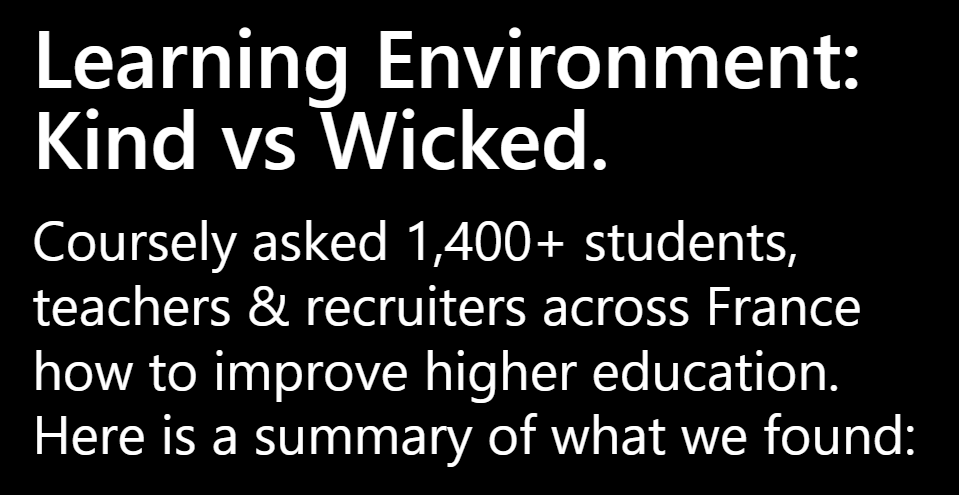Learning Environments: Kind vs Wicked.
Coursely asked 1,400+ students, teachers & recruiters across France how to improve higher education. Here is a summary of what we found:
A kind learning environment is like a friendly, no-stakes game of chess where the clear and unchanging rules of the game and the almost-instant feedback guarantee that the more you play, the better you understand the game.
A wicked learning environment is one where “information is hidden, convoluted, and feedback is delayed, inaccurate and infrequent,” such as a VUCA environment.
| Kind learning environment | Wicked learning environment |
|---|---|
| Can increase personal development and student’s self-confidence through controlled mastery, but may lack structure and discipline because there is no consequence for failure | Can increase motivation and develop adaptablity and resilience over the short-term, but prolonged failure and setbacks may lead to demotivation, burnout and abandonment. |
| Can provide a nurturing and supportive environment where student feels safe to take risks and make mistaks, but may give student a false sense of mastery when placed into a wicked environment | Lack structure and predictability, which can enhance problem-solving and critical thinking skills and inspire creativity and innovation |
| May not challenge students enough, which leads to unrealistic expectations when placed in a competitive, wicked environment | Can develop teamwork and interpersonal skills and improve communication, collaboration and leadership skills, but may also lead to extreme competitiveness up to aggression and sabotage |
| May promote empathy and emotional intelligence which promotes ethical behavior when placed in a wicked environment, but may provide poor quality feedback and criticism which do not prepare learners for real-world challenges and ethical dilemmas. | Can foster unethical behavior and a disregard for other’s well-being, as winning – or not losing – becomes the primary goal. |
| May not promote a growth mindset or strong work ethic, which may set student up for failure in faced with setbacks in a wicked environment |
A VUCA (Volatile, Uncertain, Complex, Ambiguous) environment is “constantly changing and unpredictable where everything is in flux and nothing is certain, which can be disorienting and difficult to navigate.” In a VUCA environment the successful are able to “adapt and change quickly and make decisions without complete information.”
Coursely’s research findings:
| Motivation & Feedback | Kind: motivation through positivity, encouragement, praise, and meaningful feedback Wicked: motivation through punishment, fear, shame, and humiliation Our findings: At their own pace, students understand the professional world is a wicked learning environment that teaches through punishment (denial of opportunities) and rewards through opportunities (raises, promotions…). They were raised on social media and unconsciously understand even if they cannot articulate it. In their higher education setting, students tend to prefer a kind learning environment where their teachers provide a safe learning environment that focuses on real-lworld, how-to training with personal stories and case studies to help them prepare for and succeed in wicked learning environments. Related Responses: Career Preparation, Student Satisfaction |
| Teaching Style | Kind: adaptable, need-based, student-centered teaching that promotes diversity & inclusivity Wicked: inflexible, exclusive, authoritarian teaching methods with little support and accomodation Our findings: Higher education students expect a kind classroom environment, however with quality controls set in place by their university and teachers to protect them from being treated unfairly and not being hindered by other students. Related Responses: Teaching Styles, Course Content, Career Preparation, Student Satisfaction |
| Behavioral Assessment & Measurement | Kind: prioritizes mastery and growth through meaningful and relevant tasks where mistakes are opportunites. Provides restorative justice to improve misbehavior. Promotes diversity, positivity and collaboration Wicked: prioritizes deliverables and conformity based on grades and KPIs; assign busywork and rote memorization. Mistakes are failures with consequence. Relies on punishment as a deterrent for misbehavior. Promotes conformity, punishment and competition Our findings: Students expect real-world examples, case studies and class projects relevant to their career. Likewise students expect comprehensive, personalized feedback on work submitted. Related Responses: Course Content, Workload Expectations |

